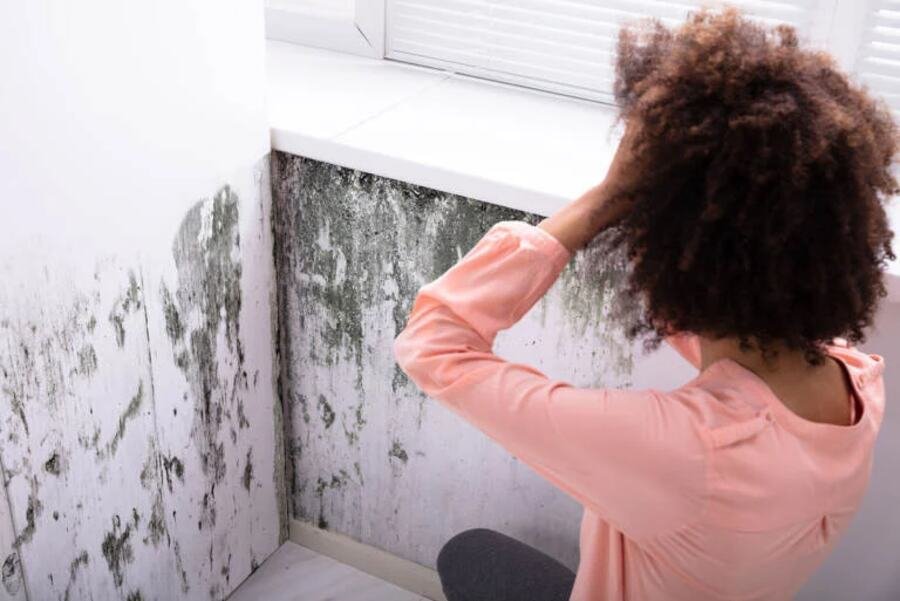The tenant relocation due to mold is a serious concern for landlords and tenants. This not only damages the property but it also causes health problems. Over time, mold spread and started messing around the rooms. If you do not address them on time, this can cause many serious problems.
So this article explains that when Tenant relocation is necessary due to mold, who is responsible for the remediation and ways to prevent mold growth? Additionally, we discuss tenants’ rights for relocation and other related information. So, read this guide and understand the correct steps to handle such occurrences.
Why is Mold a Concern in Rental?
Mold is a fungus that grows near damp and highly humid areas. They reproduce through spores, making them more harmful if they enter the air or touch skins. The report says mold can spread in just 24 to 48 hours. If someone inhales them through the air, various health problems can occur. In many cases, people exposed to mold face neurological issues as well as death, especially with autoimmune disorder patients. This fungus growth is also involved in property damage and many critical issues.
The report says black mold is your property’s most poisonous fungus. They can cause serious respiratory problems like allergies, skin rash, etc. If you are concerned about whether Tenant relocation is necessary due to mold, ensure the fungus type. Small growth of molds can make a bigger impact in a short time. Following the remediation process for such hazardous environmental substances is always important.
Is Tenant Relocation Due to Mold Necessary?
Tenant relocation due to mold depends on various factors. One of them is the type of mold and the amount of damage. If the fungus appears in an isolated bathroom area, quick remediation is possible for tenants. But they can spread quickly, so if you notice fungus near the HVAC system or behind the wall, this can be serious. In this case, mold can spread through the air and enter your body. Professional advice or Tenant relocation became a more vital concern on this occasion. Still, you should follow things before relocating from your property.
Extensive Mold Growth
This can be serious if mold spreads across rooms, especially near the HVAC system, walls, and floors. In this case, fungus spreads through the air and enters your body by breathing. Over time, households can face serious health issues like allergies, skin rashes, and more severe cases if they have autoimmune disorders. In these cases, Tenant relocation is necessary due to extensive mold growth.
Toxic Mold
Various types of molds are available, the most harmful being black fungus. This type of mold releases toxic substances called mycotoxins. Inhaling these substances can damage both humans and livestock. In some cases, individuals can experience acute poisoning to severe issues like immune deficiency and cancer. If you see toxic mold like black fungus near rooms, relocation becomes vital to prevent further health problems.
Severe Respiratory Issues
Tenants with pre-existing respiratory issues like asthma, allergies, and skin rashes should be cautious about fungus growth. These individuals experience more severe problems due to mold infections. If your household has pre-existing problems and faces more damage, relocation should be followed.
Structural Damage
Over time, mold damages structures and weakens the property. Living on the premises becomes dangerous if you see serious damage to your home and significant fungus growth. So quickly take vital steps to prevent further damage to tenants.
Who is Responsible for Mold Remediation: Tenant or Landlord?
Landlords are typically responsible for Mold remediation and Tenant relocation costs due to pre-existing causes to their property. However, this is not always the case; tenants are equally responsible for the Mold remediation if their fault causes it. Indeed, several factors depend on specifying liability in such cases. For instance, mold growth is caused by pre-existing leakage or poor property ventilation. If tenants report to the owner and don’t get an expected response, the landlord should be responsible for the occurrence.
Similarly, fungus infections caused by Tenants’ faults, like leaving wet clothes around and poor maintenance, are liable in this case. Besides mold remediation, Tenant relocation is also a concern that landlord-tenant laws define. Depending on the state’s liability counts, like
California
California law says landlords should provide a habitable living condition for their Tenants. The landlord is responsible for any mold in their rental property that causes health problems. On this occasion, tenants can take legal action against property owners and ask for expenses during relocation.
Texas
Regarding Mold in rental property, Texas law is more favorable towards landlords. However, the law says owners should follow the required repairs and fixes that threaten tenants’ health and safety. If they fail to do so, tenants still need solid proof of the damages they face while living.
New York
In New York, landlords are responsible for providing safe and habitable rental property. Structural damages or tenants’ health problems for Mold come under the general category of safe living conditions. If landlords fail to maintain safety, they should bear responsibility for remediation and temporary relocation expenses.
Tenant Rights for Relocation Due to Mold
Honestly, there is no universal law if tenants relocate due to mold. Indeed, both parties are responsible for any damages. Still, there are a few conditions available that tenants should be aware of.
- Right to receive compensation for tenants’ relocation from the property.
- Tenants can pay pre-existing rent until they find suitable alternative homes.
- Right to receive an advanced refund for any advanced rent within the lease term.
- During relocation, tenants can deliver written notice explaining possible steps to resolve the issue.
- Tenants have the right to receive suitable house alternatives meeting all safety measurements.
Remember, all these conditions apply if tenants’ relocation happens and the landlord fails to remove mold from their property. Besides, state law and other circumstances should also be checked.
FAQs
Below are the most asked questions related to the topic. Drop down to get your quick answers.
How Long Does Mold Remediation Typically Take?
Mold remediation typically takes days to a week, depending on the severity of the fungus. It induces mold types, remediation methods, affected areas, and other factors. Taking immediate action is recommended if you notice any fungus growth near the floor or wall.
Can I Withhold Rent Until the Mold is Removed?
If you report a mold outbreak to the landlord but no response comes on time, you can hold the rent until remediation proceeds. You can also charge for alternative living expenses during relocation.
What if the Mold Comes Back After Remediation?
Yes, mold can come back if the source of moisture won’t clear or be fixed. That’s why following post-inspection after 24-48 hours of mold remediation is important.
Can I Refuse to Pay Rent if the Landlord Does Not Address the Mold Issue?
Depending on the situation, some state law gives tenants the right to withhold rent if the landlord fails to fix severe mold growth. You can also file a lawsuit for any health problems due to the fungus outbreak.
Is the Landlord Responsible for Relocation Costs?
In some cases, landlords are responsible for bearing expenses for their tenant’s relocation. However, it is vital proof the owner is guilty of the occasion.
Can I Break the Lease Due to Mold?
Generally, you can break the lease if your apartment becomes inhabitable due to extensive mold growth. Still, various factors are depending on the situation.
Conclusion
That is the guide about Tenant relocation due to mold. We hope you get a clear answer related to the topic. Remember, responsibility for Tenant relocation depends on various factors. Both parties are equally liable, depending on the situation. Still, it is recommended to report to the landlord if you notice a fungus outbreak in your rental property. If no response comes from the owner, you can take legal action.
















